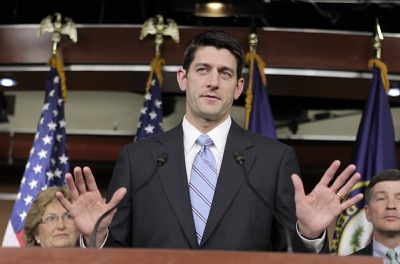
Charles Dharapak / AP
President Barack Obama outlines his fiscal policy during an address at George Washington University in Washington, Wednesday, April 13, 2011.
Wednesday, April 13, 2011 | 8:43 p.m.

House Budget Committee Chairman Paul Ryan, R-Wis., declares that he was "disappointed" in President Obama's speech on a federal spending plan, during a news conference at the Capitol in Washington, Wednesday, April 13, 2011. He is flanked by Rep. Diane Black, R-Tenn., left, and Rep. Jeb Hensarling, R-Texas, right.

Harry Reid

John Ensign
Sun coverage
Now that the president has put out his deficit-reduction plan, we have a better idea about how the impending fight over entitlement spending and taxes is going to play out between now and the start of fiscal 2012.
“Let me be absolutely clear,” President Barack Obama said during a speech Wednesday afternoon. “I will not allow Medicare to become a voucher program that leaves seniors at the mercy of the insurance industry...I will not tell families with children who have disabilities that they have to fend for themselves.”
“We will reform these programs, but we will not abandon the fundamental commitment this country has kept for generations,” he said. “That includes, by the way, our commitment to Social Security.”
The speech, especially at those points, was pretty much a direct answer to House Republicans, who are planning on getting the ball rolling on fiscal 2012 this Friday, when the House votes on Budget Chair Paul Ryan’s plan to cut the deficit by, among other measures, converting Medicare into a voucher-based system and Medicaid into block grants for the states.
The vote — and it’s a safe guess that the reception of the legislation is going to look like something very close to a party-line vote — starts the official clock on the next round of budget negotiations.
Already, it seems like there’s an emerging pattern: the president released his budget in February, but no action has yet been taken, leaving Republicans to take the first swipe by passing a plan in bill form.
But because it stands no chance of going anywhere in the Senate, it will likely stall, or perhaps get raised for an unsuccessful test vote that fails, while the president calls on Senate Majority Leader Harry Reid and House Speaker John Boehner, and whomever they deputize, to hash out a bipartisan compromise (he actually already did that today).
That’s certainly how things played out as Congress came to a compromise on the fiscal 2011 budget, in which Democrats ended up swinging heavily toward the Republican’s top-line number for cuts in exchange for removing objectionable riders.
But this round isn’t shaping up to be a dollars-for-riders debate. The dollar amounts are, for starters, too similar: Ryan says he brings deficit spending down by $4 trillion over ten years, and Obama says he can do the same over twelve.
It’s the priorities and the philosophy of how they do it that are wildly different; so dissimilar, really, that what we’re probably facing is the most existential spending debate the country has seen since the entitlement programs in question were designed.
Both sides are proposing different ways of attacking mandatory spending in the federal budget — the Medicare, Medicaid, Social Security and defense spending that make up about two-thirds of the country’s outlays every year.
Ryan’s budget takes the greatest cut from the largest part: Medicare and Medicaid, in the name of saving the programs for future generations.
In the meantime, though, it’s going to come as a fairly heavy hit for Nevadans, where Mediciad applications, especially, are through the roof — a nation-leading 60 percent uptick last year — because the state’s program expenditures are below the national average.
According to an analysis by the health care advocacy group Families USA, Nevada would lose $2.9 billion under Ryan’s proposal and an additional $4 billion in what was projected to come to the state under the new health care law to cover the required expansion of services. Ryan’s bill, as it stands, repeals those.
Reid’s office has said that would force over 136,500 current state recipients off Medicaid.
But the pendulum swings the other way, too. Ryan’s budget makes more significant budget cuts because he also maintains more significant tax cuts. The proposal does what Republicans wanted to do at the end of last year: make the Bush tax cuts permanent.
Obama does the opposite. He raises taxes for wage-earners making more than $250,000 a year, once the tax compromise Republicans and Democrats hashed out at the end of last year expires in 2012.
“They want to give people like me a $200,000 tax cut that’s paid for by asking 33 seniors each to pay $6,000 more in health costs,” Obama said Wednesday. “We can’t afford it. And I refuse to renew them again.”
His conviction was applauded by Democrats.
“There’s been a lot of talk about shared sacrifice when it comes to cutting spending and reducing the deficit,” Reid said. “Republicans believe the sacrifice should fall mainly on seniors and the middle class...We believe that the responsible approach is to make sure the wealthiest Americans contribute their fair share.”
But Obama’s plan was derided by Republicans for being a sharp political appeal that was shoddy on the economics.
“Simply put, this theory that raising taxes on the nation’s job creators will improve our economy is tired and overused,” said Nevada Sen. John Ensign. “The fact that our country has spent its way into a fiscal black hole is not the fault of those who create jobs...The way to deal with the deficit is to cut government spending, simplify the tax code and lower tax rates to encourage investment and job growth, making American businesses more competitive in the world.”
Obama’s plan would hold tax increases to about a third of cuts — a fairly conservative-leaning approach for a Democrat’s plan, and one that’s more or less in lockstep with the recommendations of the bipartisan debt commission, which also recommended a tax increase in its report at the end of last year.
Sen. Tom Coburn of Oklahoma, the Republican who’s probably the only member of the Senate more vocally, doggedly and uncompromisingly anti-excess spending than Ensign, was a member of the commission and supported its recommendations.
It would also put a trigger in place to force Congress to take deficit-reducing actions should spending start to rise.
But how exactly that would happen hasn’t been defined yet. That’s to be left up to a bipartisan panel of negotiators led by Vice President Joe Biden, according to senior White House staff.


Join the Discussion:
Check this out for a full explanation of our conversion to the LiveFyre commenting system and instructions on how to sign up for an account.
Full comments policy